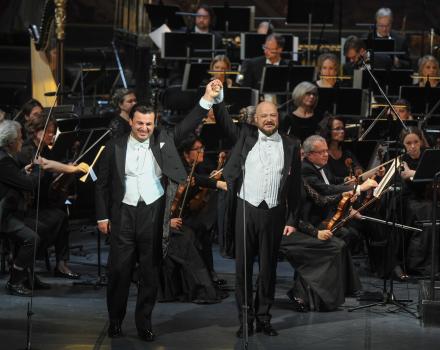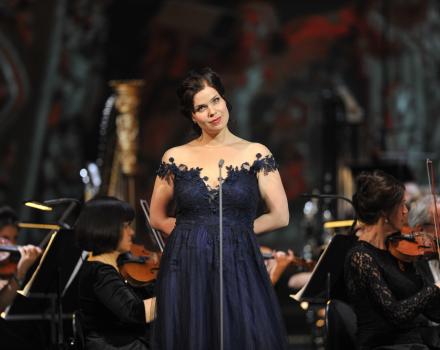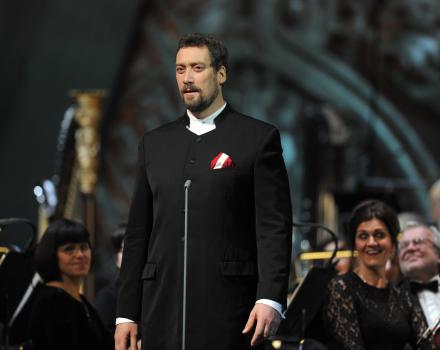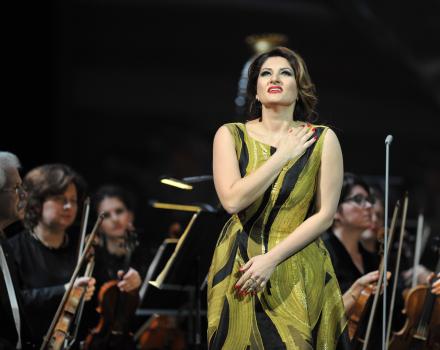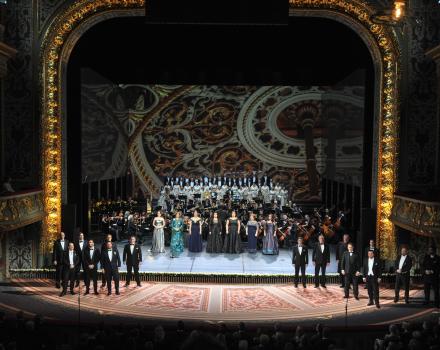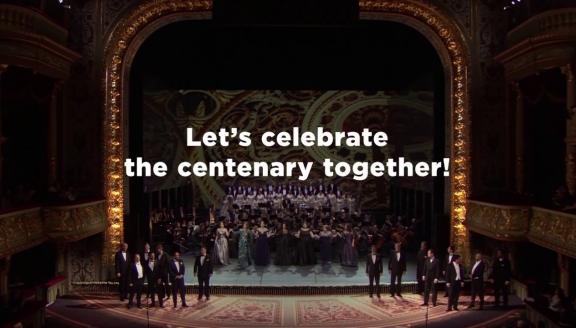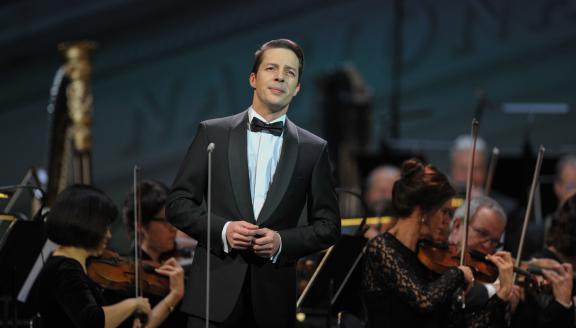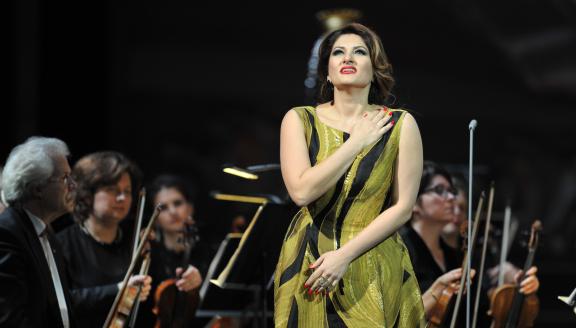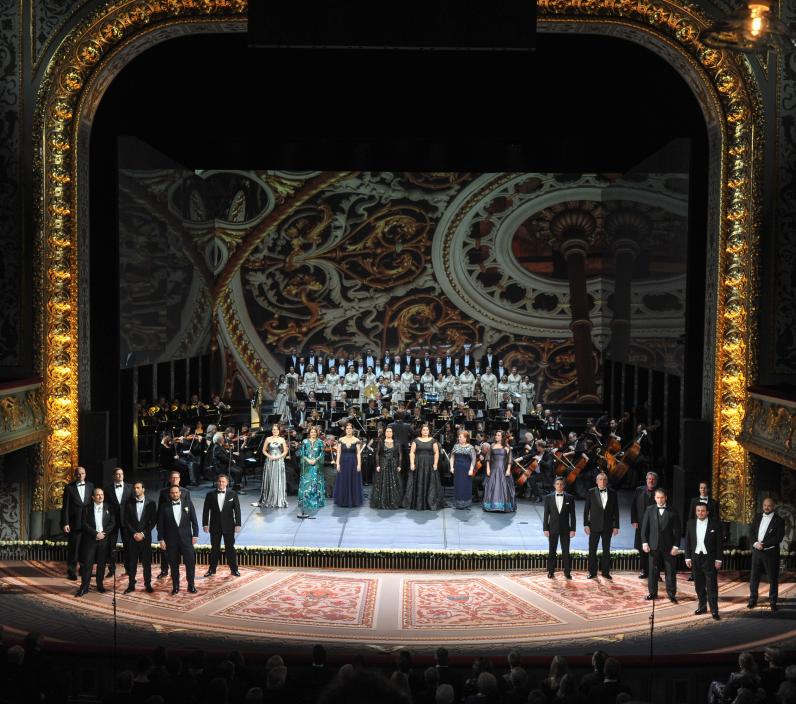

Anniversary Gala

Celebrate the centennial anniversaries of Latvian independence and the Latvian National Opera with this spectacular gala concert.
Featuring arias by the great opera composers of Italy, Germany and France, this concert also includes music by Jānis Mediņš and other leading Latvian composers of the last 100 years. Latvian National Opera soloists, internationally recognised opera stars and locally beloved singers combine to create an outstanding lineup.
Cast
Inga Kalna | Sopran |
|---|---|
Liudmyla Monastyrska | Sopran |
Dinara Alieva | Sopran |
Dana Bramane | Sopran |
Inga Šļubovska-Kancēviča | Sopran |
Olesya Petrova | Mezzo |
Zanda Švēde | Mezzo |
Stephen Gould | Tenor |
Murat Karahan | Tenor |
Rame Lahaj | Tenor |
Irakli Kakhidze | Tenor |
Raimonds Bramanis | Tenor |
Andris Ludvigs | Tenor |
Franco Vassallo | Baritone |
Vladislav Sulimsky | Baritone |
Samsons Izjumovs | Baritone |
Kalvis Kalniņš | Baritone |
Jānis Apeinis | Baritone |
Krišjānis Norvelis | Bass |
Ain Anger | Bass |
Egils Siliņš | Bass-baritone |
Rihards Mačanovskis | Bass-baritone |
Chorus | Latvian National Opera Soloists |
| ... | |
Conductor | Mārtiņš Ozoliņš, Modestas Pitrenas, Aleksandrs Viļumanis, Jānis Liepiņš, Normunds Vaicis |
|---|---|
Director | Elita Bukovska |
Sets | Mārtiņš Vilkārsis |
Lighting | Sandra Bermaka |
LNOB Chief Conductor and Music Director of the Concert | Mārtiņš Ozoliņš |
Casting Manager | Ilze Sprancmane |
Stage manager | Valda Ilgisone |
Production manager | Anda Siliņa |
LNO Orchestra Director | Miks Vilsons |
LNO Chief Chorus Master | Aigars Meri |
| ... | |
Video
The story
Part One: Latvian Opera
Jānis Mediņš
FIRE AND ICE
04:27 Chorus – ‘Lāčplēs, mēs tevi sveicam!’ LNO Chorus
Arvīds Žilinskis
THE GOLDEN HORSE
07:44 Antiņš’ aria – ‘Sirds kā uguns’ Andris Ludvigs
Romualds Kalsons
THE PRODIGAL SON
11:20 Ilze’s aria – ‘Es atceros, māt’ Inga Kalna
16:00 Roplainis’ aria – ‘Vadi mani, Laimes māte’ Rihards Mačanovskis
Bruno Skulte
THE HEIRESS OF VILKACI
18:50 Maruta and Raitis’ duet – ‘Visiem sapņiem šonakt jāpiepildās’ Dana Bramane, Raimonds Bramanis
Jāzeps Mediņš
THE PRIESTESS
24:07 Mirdza’s song – ‘Mēness starus stīgo’ Inga Šļubovska-Kancēviča
Zigmars Liepiņš
THE ROSE OF TURAIDA
27:00 Jakubowsky’s aria – ‘Ir mīla stiprāka par nāvi’ Jānis Apeinis
Jānis Kalniņš
LOLITA’S WONDERBIRD
30:42 Lolita’s aria – ‘Sārtziedu pilns ābeļzars’ Zanda Švēde, LNO Chorus
Jānis Kalniņš
HAMLET
33:20 Grave-diggers’ duet – ‘Kad biju jauns’ Krišjānis Norvelis, Kalvis Kalniņš
Romualds Kalsons
THE PRODIGAL SON
25:50 Men’s chorus – ‘Pērkonlietus šonakt līs’ LNO Chorus
Part Two: German, Italian and French Opera
Richard Wagner
LOHENGRIN
38:39 Act III Overture
Richard Wagner
TANNHÄUSER
42:05 Tannhäuser’s Rome Narration – ‘Inbrunst im Herzen’ Stephen Gould
Gaetano Donizetti
MARIA STUARDA
54:25 Maria’s prayer – ‘Deh! Tu di un’umile preghiera’ Inga Kalna, LNO Chorus
Gaetano Donizetti
L’ELISIR D’AMORE
58:45 Nemorino’s romance – ‘Una furtiva lagrima’ Rame Lahaj
Umberto Giordano
ANDREA CHÉNIER
1:03:19 Gérard’s monologue – ‘Nemico della Patria’ Egils Siliņš
Francesco Cilèa
L’ARLESIANA
1:08:20 Federico’s lament – ‘E’ la solita storia del pastore’ Irakli Kakhidze
Georges Bizet
CARMEN
1:13:40 Seguidilla – ‘Près des remparts de Séville’ Zanda Švēde
Charles Gounod
FAUST
1:16:34 Méphistophélès’s song – ‘Le veau d’or est toujours debout’ Ain Anger, LNO Chorus
Camille Saint-Saëns
SAMSON ET DALILA
1:19:15 Dalila’s aria – ‘Amour! viens aider ma faiblesse!’ Olesya Petrova
Giacomo Puccini
MANON LESCAUT
1:24:15 Manon’s aria – ‘Sola, perduta, abbandonata’ Dinara Alieva
Giacomo Puccini
TOSCA
1:30:29 Cavaradossi’s aria – ‘E lucevan le stelle’ Murat Karahan
1:34:21 Scarpia’s aria – ‘Tre sbirri... Una carrozza’ Samsons Izjumovs, LNO Chorus
Part Three: Giuseppe Verdi
Giuseppe Verdi
ATILLA
1:39:16 Ezio’s aria – ‘Tregua è cogl’Unni… Dagl’ immortali vertici’ Franco Vassallo
Giuseppe Verdi
MACBETH
1:45:13 Lady Macbeth’s aria – ‘Ambizioso spirto tu sei, Macbetto… Vieni! t’affretta!’ Liudmyla Monastyrska
1:53:18 Macduff’s aria – ‘O figli, o figli miei!... Ah, la paterna mano’ Rame Lahaj
Giuseppe Verdi
NABUCCO
1:57:30 Zacharia’s cavatina – ‘Sperate, o figli!... D’Egitto là sui lidi’ Ain Anger, LNO Chorus
2:05:36 Nabucco and Abigaille’s duet – ‘Donna chi sei?’ Liudmyla Monastyrska, Franco Vassallo
Giuseppe Verdi
RIGOLETTO
2:16:23 Rigoletto’s aria – ‘Cortigiani, vil razza dannata’ Vladislav Sulimsky
Giuseppe Verdi
LA FORZA DEL DESTINO
2:22:07 Leonora’s aria – ‘Pace, pace, mio Dio!’ Dinara Alieva
Giuseppe Verdi
ERNANI
2:28:44 De Silva’s cavatina – ‘Che mai vegg’io!... Infelice! e tuo credevi’ Egils Siliņš
Giuseppe Verdi
IL TROVATORE
2:35:11 Azucena’s aria – ‘Condotta ell’ era in ceppi’ Oļesja Petrova
Giuseppe Verdi
LEONORA
2:40:34 Leonora and Count Luna’s duet – ‘Udiste? Come albeggi’ Liudmyla Monastyrska, Vladislav Sulimsky
Giuseppe Verdi
OTELLO
2:28:47 Otello’s monologue – ‘Dio! mi potevi’ Stephen Gould
Giuseppe Verdi
DON CARLOS
2:54:32 Don Carlos and di Posa’s duet ‘Dio che nell’alma infondere’ Irakli Kakhidze, Vladislav Sulimsky
Giacomo Puccini
TURANDOT
2:58:05 Calaf’s aria – ‘Nessun dorma’ Murat Karahan, LNO chorus
3:02:07 Finale – ‘Diecimila anni al nostro Imperatore!’ Soloists and LNO Chorus
Insights
The Opera was, is and will be
A message from Zigmars Liepiņš, Chairman of the Board of the Latvian National Opera and Ballet
The Latvian National Opera was born at a time when all around was the sound of mortars, the noise of war. The map of Europe changed, as did the whole world. People, in their minds and hearts, understood that the Opera must endure, even through those conditions.
And so it was. The Opera survived The Bermondt Affair, the Second World War, two occupying forces and today, in a free nation, is once again the most significant cultural institution, a place where all art forms come together.
As a bridge between national and international art it is completely a part of the European artistic space. The Opera will be! It will not be suppressed by materialistically inclined clerks and short-sighted temporary management.
The Opera and Ballet was, is, and will be – always! I congratulate our artistic team and our audience on this celebration.
The Latvian National Opera can boast many proud achievements in this, the company’s first 100 years. Here are some highlights:
1918-19: The first season opens with a concert in September in Riga’s Second City Theatre under the baton of co-founder, director and perennial chief conductor Teodors Reiters. One month later the company performs its first opera, Wagner’s The Flying Dutchman. The following year they move to their current home, the former Riga First City Theatre.
1920s: Alfrēds Kalniņš composes and conducts Baņuta, the first opera with a Latvian libretto. The LNO’s first performance of Puccini’s Madame Butterfly is the inaugural broadcast of Riga Radio. The company flourishes artistically under principal conductor Emil Cooper.
1930s: Max Reinhardt directs Johann Strauss’s Die Fledermaus using a revolving stage brought from Berlin. Glazunov and Stravinsky visit Riga and perform at the LNO. Mikhail Chekhov produces Wagner’s Parsifal with a partly covered orchestra pit in an attempt to achieve the sound characteristic of Bayreuth.
1940s: Elfrīda Pakule stars as Queen of the Night in Mozart’s The Magic Flute. Conductor Leonīds Vīgners lays the foundations to restoring the opera company and orchestra after the
War. Aleksandrs Viļumanis plays the title role in Rubinstein’s The Demon. Latvian National Opera is renamed as the Latvian S.S.R. State Opera and Ballet Theater.
1950s: The company reaches new levels of artistic quality under the leadership of conductor Edgars Tons. Italian tenor Tito Schipa visits Riga and discovers the Latvian baritone Kārlis Zariņš. Pēteris Pētersons directs The Green Mill, a sparkling Latvian comic opera by Marģeris Zariņš.
1960s: Dmitry Shostakovich visits Riga and participates in the rehearsals of his opera Katerina Ismailova. Jānis Zariņš stages a production of Britten’s Peter Grimes. A production of Verdi’s Il trovatore sung in Italian marks the return to performing operas in their original language instead of in Latvian or Russian.
1970s: Estonia’s Eri Klas conducts Gershwin’s Porgy and Bess. Jānis Zariņš creates an iconic production of Puccini’s Turandot that will remain in the company’s repertoire to the present day. Latvian prima donna Žermēna Heine-Vāgnere, still in outstanding vocal form, performs unforgettable farewells to the stage.
1980s: The Baltic opera houses host friendship concerts with soloists representing all three countries. Samsons Izjumovs gives an outstanding performance as the tragic fool in the title role of Verdi’s Rigoletto. Having been renamed as the Latvian S.S.R. State Opera and Ballet Theater 45 years earlier, the theatre recovers its historical title of the Latvian National Opera.
1990s: The opera house is restored over a period of four years. It reopens with Jānis Mediņš’s Fire and Night in a postmodern production by Alvis Hermanis. A new tradition is established with the Riga Opera Festival showcasing the new and best productions of the season.
2000s: At the age of 24, Andris Nelsons accepts the position of chief conductor of the LNO. Mariss Jansons conducts the Royal Concertgebouw Orchestra in a concert at the opera house. Elīna Garanča makes her role debut as Carmen in a production of Bizet’s opera set in Cuba.
2010s: The LNO stages the world premiere of The Heiress of Vilkaci by Latvian composer Bruno Skulte.The Riga Opera Festival celebrates Wagner’s 200th anniversary with a complete cycle of The Ring. A new production of The Flying Dutchman opens the company’s 100th season and is streamed live on OperaVision.
Gallery
